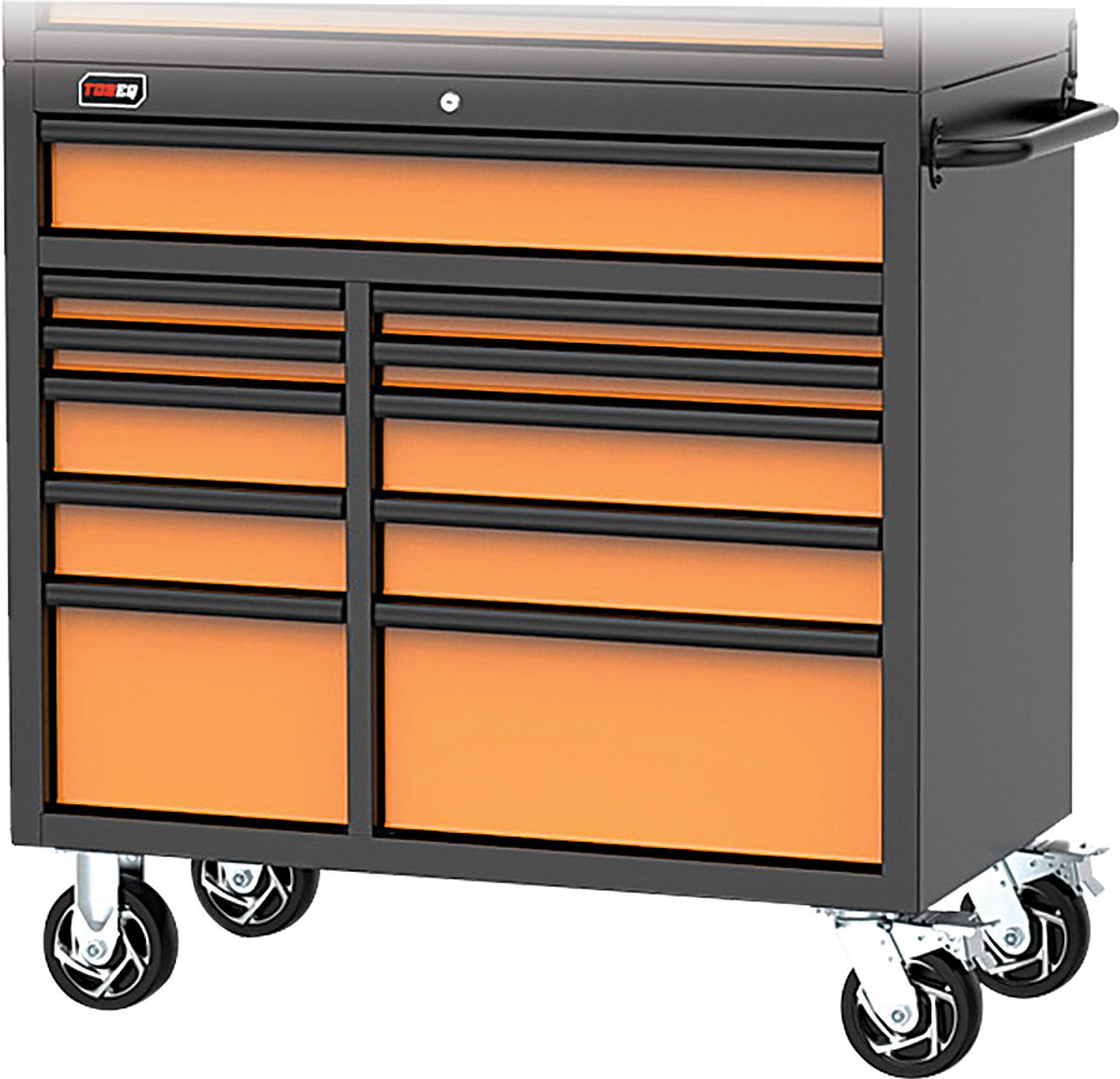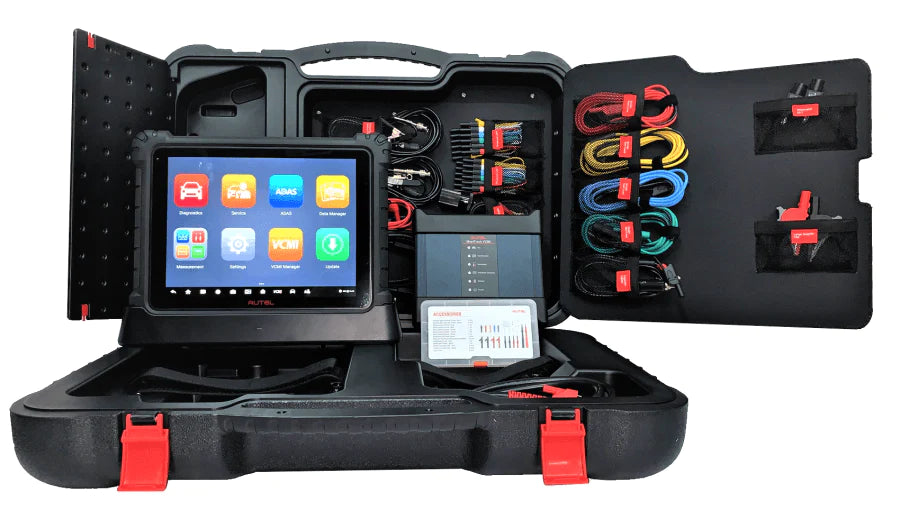They certainly aren’t making cars any less complicated these days. Emissions sensors. Tire pressure sensors. Engine knock sensors. Seems like you can’t even get through an oil change nowadays without plugging something into a computer. Add to that high tech functionality all of the “classic” issues from electrical gremlins to “strange noises” coming from every conceivable direction, and it’s plain to see why so many car diagnostic tools are becoming part of every mechanics tool kit.
Yes, there’s a specialty tool for just about every issue, but don’t sweat it! We’ve rounded up all the most common types of car diagnostic tools you’ll need below whether you’re a DIY’er or a career mechanic and broken them down for you tool by tool.
As always, if you’ve got a question about any specific tool on our list below or even one you don’t see mentioned, drop us a line and let us know!
Thermometers
Analog… Infrared… Laser guided… Thermometers come in quite a few flavors, but they all serve the same purpose: To tell you the temperature of various parts of your vehicle.
And while the role of a good thermometer sounds simple enough, you might be surprised at the number of things you’ll use them for.
Got an issue in your cooling system? Use a thermometer to check your return lines and radiator for hot and cold spots.
Engine throwing a code for a misfire? Give your exhaust manifold a good once over to figure out which cylinder is the culprit.
Something off with your braking system? Any rotor running a lower temperature than the rest isn’t doing its job.
We’re only scratching the surface here but you get the idea. A good thermometer is a good investment.
Scan Tools
Scan tools come in several varieties as well. While older or simpler cars run on standard plug in OBD systems, many newer models can actually be scanned wirelessly.
Classic OBD Scan Tools
These are plug-and-play car diagnostic tools similar to what you might borrow from behind the counter at an auto parts store. Classic scan tools connect to a port in your vehicle (typically below the dash), and are used to read any check engine lights or codes your car’s onboard diagnostic system is throwing out.
Some tools are more advanced than others, and do double duty reading ABS systems, clearing and resetting codes and dashboard lights, and even reading VIN information.
Advanced Scanning And Reprogramming Tools
In addition to basic diagnostics and code clearing, tools like the Autel MaxiIM will handle everything from key fob programming to ECU reflashing.
These high-tech all-in-one modules are some of the most capable tools on the market today. They utilize large, full-color screen tablets, intuitive touchscreen interfaces, and can run diagnostics on every system in a vehicle including airbags, active suspension systems, battery management, and throttle response.
Advanced scanning tools are an investment, but considering they’re programmed to handle service on everything from domestic fleet vehicles from GM and Ford to foreign exotics from McClaren and Lamborghini, regular mechanics will have no trouble getting their money’s worth of these valuable tools.
TPMS Scan And Service Tools
TPMS diagnostic tools allow you to read, install, and program new and existing TPMS sensors.
Tools like the Autel MaxiTPMS will identify existing sensors, read and activate new sensors, and program sensor data by connecting wirelessly with a vehicle's ECU. TPMS sensors aren’t going anywhere anytime soon (they’ve been a requirement in both the U.S. and Europe since 2012), so if you haven’t picked one up already (or need a more reliable one), there’s no time like the present.
Autel has recently started manufacturing budget-friendly TPMS tools as well for professionals and home mechanics alike, so if you’re not ready to jump into a premium unit like the MaxiTPMS above, take a look at the TS408.
Multimeters
No mechanic’s tool kit is complete without a quality multimeter. A good multimeter is the gold standard for electrical troubleshooting of all kinds. Testing batteries, quickly locating blown fuses, tracking down electrical shorts, identifying faulty switches… If it uses electricity, a multimeter can give you all the information you need to know.
As an added bonus, the same multimeter you keep in your automotive tool kit will double as a reliable companion around the house. Replacing light switches, installing ceiling fans and fixtures, or troubleshooting home appliances are all in the multimeter’s wheelhouse.
Circuit And Volt Testers
If you’ve ever had the pleasure of trying to track down an electrical short *somewhere* in a long and winding wiring harness, you’ll wonder how you ever lived without a dedicated circuit tester.
Circuit testers like the Power Probe ECT3000 can not only quickly determine whether a short/open fault exists, but will also lead you straight to the source of the issue using a wireless signal receiver.
Other more basic models consist of a simple connection to your vehicle’s battery and a single standalone probe. These circuit testers can be used to verify power and ground on just about any component from instrument clusters to air bags.
Inspection Cameras/Borescopes
Inspection cameras (also called borescopes) are compact cameras you can feed into tight and narrow spaces. Their uses are practically limitless: Checking for oil leaks in hard to reach areas, getting an up close look at pistons and cylinder walls, locating rust and corrosion inside body panels, inspecting internal transmission wear… If you can imagine it, an inspection camera can make it happen.
Many also come with attachments like magnets for locating and retrieving fallen nuts and bolts in hard to reach areas, hooks to grab onto loose wires and cables, and mirrors that peek around sharp corners.
Some borescopes connect easily to a computer using a simple USB plug in, while others like the E-Z Red MV500 are standalone units with their own high-definition tablets included!
ABS Sensor Testers
Adding a quality ABS tester to your tool box is the quickest and easiest way to troubleshoot potential issues with wheel speed sensors.
These car diagnostic tools remove the hassle of diagnosing ABS issues using a simple digital volt/ohm meter. Just connect the tool directly to the sensor and give the wheel a spin and the tester will let you know if you’ve got a proper signal output. As an added bonus, if your sensor is faulty, an ABS tester will also alert you of any possible short/open circuits, and can even help pinpoint the issue in the wiring harness when used in conjunction with a scan tool.
Trailer Testers
These portable trailer diagnostics on wheels allow users to quickly test and verify all essential functions of industrial trailers on the go. A plug-and-play pigtail adaptor quickly diagnoses any lighting issues, color-coded hookups for air lines give clear readouts on the trailer’s air brakes, and an ABS module lets you know the status of anti-lock braking systems.
Mechanic’s Stethoscopes
Just like a medical doctor uses a stethoscope to pinpoint issues inside the body, a mechanic uses a stethoscope to locate and diagnose squeaks, rattles, and shudders along a vehicle’s chassis. Stethoscopes are one of the quickest and easiest ways to to locate faulty bearings, bad injectors, or other issues creating irregular noises from the engine as well.
EVAP And Gas Leak Detectors
Got an air conditioning system that won’t stay charged but can’t pinpoint your leak? Advanced combustible leak detectors like the Mastercool 55975 take all the guesswork out of locating the source, saving you time and money spent making unnecessary repairs and replacements.
As an added bonus, these sophisticated tools work just as well for automotive applications as they do for home repairs of hot water heaters, refrigerators, and any other appliances using combustible gasses. No more fooling with messy liquids or fluorescent dyes, just switch it on and scan your potential fault points.
Tachometers
Handheld tachometers are incredibly useful car diagnostic tools for detecting and adjusting the idle speeds of vehicles without dedicated tachometers of their own.
They come in handy for work on just about any type of small engines, motorcycles, generators, and full-sized automotive applications. Some work through direct contact with a running engine, typically through a plug wire, while others use touch-free laser technology to determine engine speed in real time.
Refractometers
A refractometer is a unique tool that uses precision optics to gauge the chemical composition of a liquid sample. These devices are often used by brewers to dial in the ideal gravity of a new beer, but in the automotive world we typically use them to measure the concentration levels of Diesel Exhaust Fluid (DEF).
If you’ve got a diesel truck throwing a code for DEF, a refractometer can quickly tell you whether or not the issue is a sensor/CPU problem or the fluid itself. Some refractometers in our store like the Mueller-Kueps 727 will also test coolant, washer fluid, and even battery acid!

































































































































































